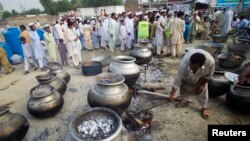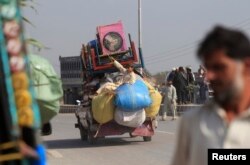Aid agencies in Pakistan’s restive northwestern region are struggling to provide services to help curb militancy and deliver aid because they lack government permission to operate, according to humanitarian organizations.
The aid groups say the government is creating obstacles for them to obtain a "No Objection Certificate" (NOC) in northwestern Khyber Pakhtunkhwa province, which has been hard-hit by militancy and terrorism. The certificate is a requirement for an organization to work in the area.
“Getting an NOC is almost impossible in the areas where military operations are currently ongoing,” Tahira Abdullah, a human rights activist in Pakistan, told VOA.
Humanitarian and aid organizations are required to have the document, which is a form of approval from the provincial government prior to starting projects in the region.
Foreign-funded local organizations in northwestern Pakistan provide humanitarian and emergency assistance, including health, education, and food distribution, to more than two million people who have been displaced by ongoing Pakistani military operations against militant groups.
Some of the local organizations help teach programs on empowering women and young people that are designed to help curb a spreading extremist ideology among Pakistani youth.
For the past few years, obtaining NOCs has increasingly become harder for aid agencies in Pakhtunkhwa, according to the NGOs. They say the restrictions have adversely affected aid effectiveness in the militancy-torn region.
“There are more than 15 aid agencies waiting for issuance of ‘No Objection Certificate’ from the Pakhtunkhwa government for over seven months now,” Sher Zaman, provincial program manager for the South Asia Partnership Pakistan organization, told VOA. The process should not take more than two to three months according to government regulations, Zaman said.
Officials ‘looking into the matter’
Mushtaq Ghani, a spokesperson for the provincial government, told VOA, that authorities are aware of the delays.
“I’ve heard complaints from different aid agencies,” Ghani said. “I’m looking into the matter along with Home Department.”
Ghani said the certificate regulations were introduced to “verify the aid agencies” as some militant organizations use aid groups as a cloak for terrorist activities.
“We’ve got to be careful before we allow any aid agency receiving foreign aid to start operation in the region,” Ghani said.
But the prolonged delays are leaving a void in education and employment as aid groups are not able to hire or educate children.
Aid groups say the restrictions have alienated young people who are a target for militants recruiters. According to aid groups, more than 6,500 people in the tribal region have lost their jobs during the past few months due to restrictions on aid agencies.
Civil society activists say the government often does not provide a reason for delaying issuing a certificate.
“We’ve tried to talk to different departments of the government on the matter. But they just wouldn’t give you a reason or an answer,” Sher Khan, vice chairperson of the Human Rights Commission of Pakistan in Pakhtunkhwa told VOA.
Unwelcome scrutiny
Some activists say the restrictions on aid groups are an attempt by the government to avoid outside scrutiny.
Pakistan’s military has been accused by activists of human rights violations in the tribal region. Thousands of people have been rounded up in what the government calls terrorism-related probes and are classified as missing, the groups said.
Human rights experts say that civil and military governments in Pakistan through the years have shunned progressive, liberal and rights-based aid agencies.
“These organizations also monitor government performance and write alternate/shadow reports to rebut the distorted, untruthful government reports to U.N. bodies on United Nation Conventions that Pakistan has ratified,” said one activist named Abdullah.
Advocates say humanitarian organizations are needed in the restive area to educate people on their rights.
“We really need initiatives from aid agencies through which we can make people aware of their rights and to make them demand their basic needs from the government,” said Shabaan Ali, who runs a non-governmental organization to help empower his tribesmen.






